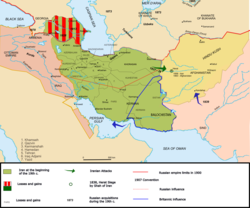Qajar
| Sublime State of Iran | ||||||||||||||||
|
دولت علیّه ایران Dowlat-e Aliyye-ye Irān |
||||||||||||||||
|
||||||||||||||||
|
||||||||||||||||
|
Anthem Salâm-e Shâh (Royal salute) |
||||||||||||||||
|
Map of Iran under the Qajar dynasty in the 19th century.
|
||||||||||||||||
| Capital | Tehran | |||||||||||||||
| Languages |
|
|||||||||||||||
| Government |
|
|||||||||||||||
| Shahanshah | ||||||||||||||||
| • | 1794–1797 | Mohammad Khan Qajar (first) | ||||||||||||||
| • | 1909–1925 | Ahmad Shah Qajar (last) | ||||||||||||||
| Prime Minister | ||||||||||||||||
| • | 1906 | Mirza Nasrullah Khan (first) | ||||||||||||||
| • | 1923–1925 | Reza Pahlavi (last) | ||||||||||||||
| History | ||||||||||||||||
| • | Qajar dynasty begins | 1789 | ||||||||||||||
| • | Treaty of Gulistan | 24 October 1813 | ||||||||||||||
| • | Treaty of Turkmenchay | 10 February 1828 | ||||||||||||||
| • | Treaty of Paris | 4 March 1857 | ||||||||||||||
| • | Treaty of Akhal | 21 September 1881 | ||||||||||||||
| • | Persian Constitutional Revolution | 5 August 1906 | ||||||||||||||
| • | Pahlavi dynasty begins | 1925 | ||||||||||||||
| Currency | qiran | |||||||||||||||
|
||||||||||||||||
| Today part of | ||||||||||||||||
The Qajar dynasty (![]() listen ; Persian: سلسله قاجار Selsele-ye Qājār; also romanised as Ghajar, Kadjar, Qachar etc.; Azerbaijani: قاجارلر Qacarlar) was an Iranian royal dynasty of Turkic origin, specifically from the Qajar tribe, which ruled Persia (Iran) from 1785 to 1925. The state ruled by the dynasty was officially known as the Sublime State of Iran (Persian: دولت علیّه ایران Dowlat-e Aliyye-ye Irān). The Qajar family took full control of Iran in 1794, deposing Lotf 'Ali Khan, the last of the Zand dynasty, and re-asserted Iranian sovereignty over large parts of the Caucasus. In 1796, Mohammad Khan Qajar seized Mashhad with ease, putting an end to the Afsharid dynasty, and Mohammad Khan was formally crowned as shah after his punitive campaign against Iran's Georgian subjects. In the Caucasus, the Qajar dynasty permanently lost many of Iran's integral areas to the Russians over the course of the 19th century, comprising modern-day Georgia, Dagestan, Azerbaijan, and Armenia.
listen ; Persian: سلسله قاجار Selsele-ye Qājār; also romanised as Ghajar, Kadjar, Qachar etc.; Azerbaijani: قاجارلر Qacarlar) was an Iranian royal dynasty of Turkic origin, specifically from the Qajar tribe, which ruled Persia (Iran) from 1785 to 1925. The state ruled by the dynasty was officially known as the Sublime State of Iran (Persian: دولت علیّه ایران Dowlat-e Aliyye-ye Irān). The Qajar family took full control of Iran in 1794, deposing Lotf 'Ali Khan, the last of the Zand dynasty, and re-asserted Iranian sovereignty over large parts of the Caucasus. In 1796, Mohammad Khan Qajar seized Mashhad with ease, putting an end to the Afsharid dynasty, and Mohammad Khan was formally crowned as shah after his punitive campaign against Iran's Georgian subjects. In the Caucasus, the Qajar dynasty permanently lost many of Iran's integral areas to the Russians over the course of the 19th century, comprising modern-day Georgia, Dagestan, Azerbaijan, and Armenia.
...
Wikipedia


